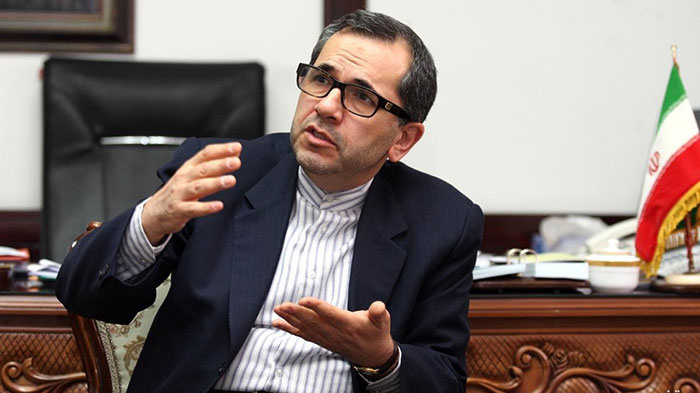No Secret Docs in Nuclear Deal: Iran’s Deputy Foreign Minister

In the lede to her interview with Deputy Foreign Minister for European and American affairs Majid Takht-Ravanchi, ILNA’s Sara Riazi hails the diplomat’s unique eloquent oratory. “He breaks the ice of aridly formal interviews by asking friendly everyday questions … that emboldened me to solicit explicit responses rather than conservative remarks during the interview”. In his extensive talk to Iranian Labor News Agency (ILNA), Majid Takht-Ravanchi has touched a range of issues, including the nuclear deal, Iran’s international image, prisoners swap, as well as domestic policies.
Here are a few highlights:
· The fruit of JCPOA implementation is the lifting of sanctions. If we cannot pick the fruit, then the deal has not been implemented successfully. However, this takes time. The negative international air [around the country] should be broken down. Of course, this has been the case so far and to some extent. The fact that banks, except for big ones, have started working with Iran is the result [of this new atmosphere].
· Even if we assumed that we have three years to go before the [next presidential] election, time would remain an important factor for the foreign ministry in the implementation of the deal. We do not want to sacrifice national interests for the sake of speed, although time is important in achieving national interests.
· The [Rouhani] administration will not adopt expediency or compromise because of the elections. We believe that the JCPOA is a trans-partisan issue of national security.
· With the deal, we have a higher capacity to play a constructive role in the region. Unfortunately, however, measures by the opponents to the deal changed the atmosphere. The Saudis and the Zionist regime [of Israel] spared no effort to block the deal. After the deal, they felt that they had totally lost the game and the atmosphere could become against them.
· The Saudis are trying to revive the Iranophobia that vanished after the deal, but such measures will fail and it will be eventually clear who is working for the stability of the region and who is not.
· Academic relations between universities and students swap has started with European countries like Germany, Netherland, and France. Ms. Mogherini visited Iran accompanied with seven EU commissioners, which was unprecedented. We have good relations with all EU countries. We are in talks with some about the refugees, with some about political issues.
· [Domestic] Criticism is a right and a duty, too. At some points, criticisms could be useful and helpful. We sometimes put these criticisms to [good] use during the talks, both by correcting our work and by showing the other party that there are different voices in our country. However, when that line is crossed, which makes criticism unconstructive and personal, it will be difficult to tolerate.
· [On hardliners’ criticism of Zarif’s leniency during nuclear talks:] How could someone who had never attended the talks pass judgment that it was all smiles in Lausanne, Geneva, and Vienna? I personally witnessed that Mr. Zarif sometimes shouted during negotiations so loudly that he could be heard from outside the room. His dedication to national interests made him stand up for them and resist.
· Republicans and critics of Obama claim that secret deals have been reached during the talks, which is not true. Part of the issues regarding [Iran’s] 15-year nuclear outlook has been signed in a classified IAEA document, which were not supposed to go public. There are no other confidential documents. Of course, we had nothing to hide and everything about the deal was carried out in consultation with domestic institutions including the parliament and the Supreme Leader [’s bureau]. As we approach the US presidential race, some documents and agreements with the IAEA and the UN Security Council are referred to as the secret sides of the nuclear talks.
· Ransom [claims in the prisoners swap] makes no sense. Iran does not permit or tolerate such a rhetoric towards its conduct. Talks about Iran’s credits [from Washington] and the prisoners swap just coincided on the sidelines of the nuclear talks.

